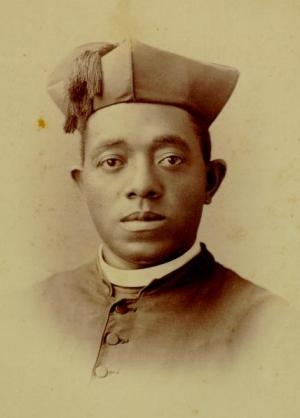 |
| Photo provided by publisher Ignatius Press shows the Rev. Augustine Tolton, the first black Roman Catholic priest in the United States. (Courtesy Ignatius Press/AP) |
There are only small signs that Augustine Tolton was here.
A few buildings, including a home for senior citizens, carry his name. But the Roman Catholic church where he preached his sermons to flocks of adoring parishioners on Chicago's South Side is long gone.
And few know the story of the man himself - a slave who grew up to become the first acknowledged black Catholic priest in the United States.
``When he was alive, his life would probably not have been considered that newsworthy. He lived at a time when to be a person of color automatically meant that you were not a person of significance,'' says Atlanta Archbishop Wilton Gregory, who served from 2001-2004 as the first black president of the U.S. Conference of Catholic Bishops. ``So the very fact that he was able to accomplish what he accomplished under severe limitations was to his credit.''
Even Gregory, a native Chicagoan, did not know Tolton's story until he was well into adulthood.
``We need to find vehicles to make him better known today,'' he says.
To that end, a book about Tolton's life - ``From Slave to Priest'' - is being reissued by San Francisco-based Ignatius Press. The biography was written by Sister Caroline Hemesath, who first published the work in 1973.
It is a story of struggle and perseverance.
The second of three children, Tolton was born in 1854 to Catholic parents who were slaves in Missouri, just a few years before the start of the Civil War.
His father, Peter Tolton, was one of many slaves who escaped to join the Union army and fight for black freedom - and who died battling for that cause, according to Hemesath's book.
Augustine, along with his mother, Martha Jane, and his two siblings, escaped across the Mississippi River to Illinois, frantically rowing a boat while ducking Confederate gunfire. Eventually, they landed in Quincy, Ill., where Martha Jane, Augustine and his brother Charley worked in a tobacco factory.
Tolton met priests and nuns throughout his life who helped him, including some who taught him to read. Others, however, were angry that a black boy was being educated with whites and tried to stop him from realizing his dream of becoming a priest.
After years of rejection by U.S. seminaries, pleas on his behalf from sympathetic Catholics finally allowed Tolton to study in Rome, leading to his ordination in 1886, when he was 31.
Tolton had hoped to become a missionary in Africa as an escape from American racism. Instead, he was assigned to a church in Quincy and later Chicago - a bitter disappointment that he nonetheless dutifully accepted. He went on to face more hardship and resentment, and little financial support for the black churches he oversaw.
``If anybody had an excuse to leave the Catholic Church, it was him,'' says Harold Burke-Sivers, a deacon in a Portland, Ore., parish, who is also African-American and who wrote the introduction to the newly issued biography.
But Tolton recognized that Catholics who discriminated against him were violating church teaching on the dignity of all people and he dedicated himself to changing that, says Burke-Sivers.
``He saw what the church could be,'' he adds.
Tolton was credited with becoming a unifying force for black Catholics, especially in Chicago. ``Good Father Gus,'' as his parishioners often called him, was known for his eloquent sermons, his beautiful singing voice and his gift for playing the accordion.
By 1893, however, Hemesath wrote that Tolton was beginning to be plagued by ``spells of illness,'' though he shrugged them off, preferring to focus on his work and his parishioners.
That work was cut short when he collapsed and died during a brutal Chicago heat wave in 1897. He was 43.
Burke-Sivers believes it is a story that is still relevant - not only for black Catholics.
``Young people can look to Father Augustine's legacy and be inspired - and be able to say, 'If he could do it, so could I,''' Burke-Sivers says.
At the same time, some wonder what Tolton would think about the struggles black Americans still face inside and outside the church. Only about 4 percent of the nation's 64 million Catholics are African-American, according to an estimate by the Center for Applied Research in the Apostolate. Just last month, New Orleans Archbishop Alfred Hughes issued a wide-ranging pastoral letter decrying racism and acknowledging the problem still exists in the church.
``After all these years, nothing really has changed,'' says Adrienne Curry, managing editor of the Black Catholic Chicago Web site, who also works for the Archdiocese of Chicago.
``I think Father Tolton would be saddened but hopeful at the same time - just like we are.''
Page created on 3/18/2007 12:00:00 AM
Last edited 9/11/2018 3:34:05 PM
